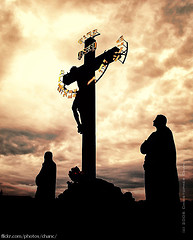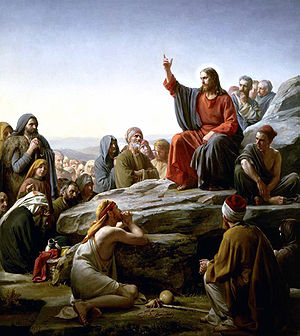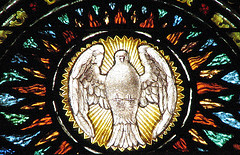
- Image by Christopher Chan via Flickr
Today’s rosary meditation is The Fifth Sorrowful Mystery — The Crucifixion. After suffering through the scourging, being mocked with a crown of thorns, and carrying a cross, Jesus died alongside two criminals. People seeing Jesus on the cross were puzzled because He saved others, but couldn’t save Himself (Matthew 27:42). They wanted Him to perform one more miracle so that they would believe in Him forgetting all the miracles He had already performed and that His largest miracle, conquering death and opening the gates of Heaven, was yet to come.
I feel that Jesus’ crucifixion is the ultimate example that we are all called to follow God’s plan even in the face of great difficulty. Jesus, being the son of God, could have easily put an end to His suffering any time He wanted. And yet, He suffered and died horribly. Why? Because Jesus practiced what He preached. His entire ministry revolved around the principles of sacrifice, redemptive suffering, charity, forgiveness, and having faith in God’s plan for us. And when the time came for His crucifixion, Jesus did not ignore His teachings in order to save his earthly body. When Jesus taught that we must “take up our cross” in order to gain salvation, He knew full well those words also applied to Him. Therefore, as imitators of Christ, we cannot ignore or avoid God’s will when we find ourselves in difficult situations.
Jesus’ crucifixion, while extreme, highlights a situation we find ourselves in all the time. How often do we try to ignore God’s plan for us because following it causes difficulty or suffering? How many times do we feel the urge to tell a little lie in order to avoid punishment? How much easier is it to drown ourselves in drugs or alcohol when times are difficult? How much simpler is it to “go with the crowd” and not stick out even when the crowd is not living morally? But God calls us to have faith in His plan despite our situation. Jesus loved and forgave those who tortured or abandoned Him on the cross because God’s way is one of unconditional forgiveness. We often try to make excuses for our shortcomings, but in the end we must understand that we are called to live as Jesus taught us 24 hours a day, 7 days a week without exception. The last time I checked, Jesus did not say “love thy neighbor EXCEPT when he is really, really annoying.”
Let us recall those times in our lives when we did not follow God’s will because it seemed too difficult. Let us remember when we ignored His plan out of fear of suffering and pray that we can show more resolve in the future. May we remember that all earthly suffering is temporary and is a minuscule when compared to the infinite joy and happiness of Heaven we gain by following Christ. It’s true that many people have a much tougher road and a much heavier cross to bear than others. But we must have faith that God never gives us a larger burden than we can handle. So we should pray, not only that we have find our innate strength to imitate Jesus’ unconditional love and sacrifice, but that others can find that same God-given, moral fortitude as well.
Related articles by Zemanta
- Underestimating the Cross: (brothersjuddblog.com)
- The Proof of God’s Love (Part 1) (justanotherclaypot.blogspot.com)




![Reblog this post [with Zemanta]](http://img.zemanta.com/reblog_e.png?x-id=1e263cd7-2ce8-4a88-b6fd-cd005d40b1f9)





